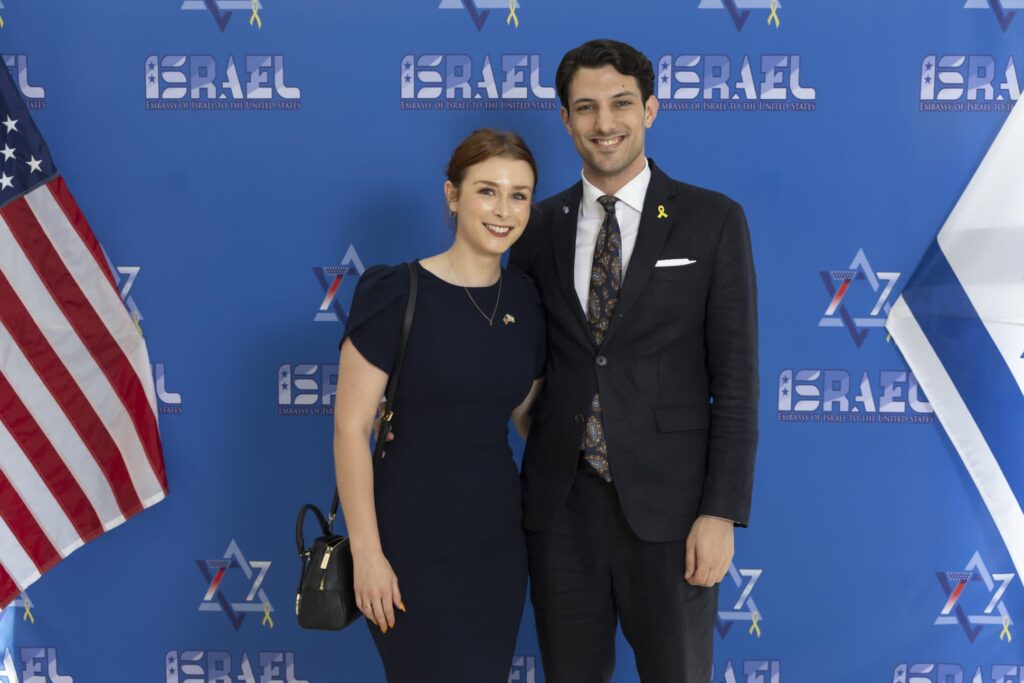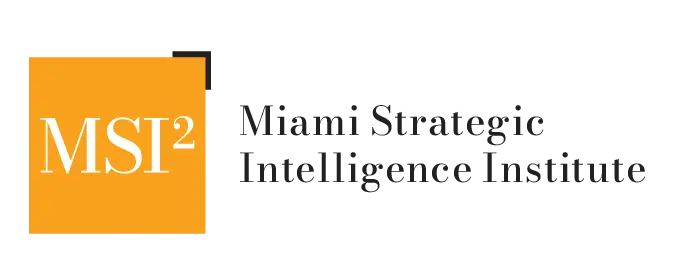23 May From Protest to Bloodshed: The Murder of Israeli Diplomats and the Rise of Homegrown Terrorism in America
By,
Jesús Daniel Romero, Co-Founder, Senior Fellow, MSI²
Introduction: The murder of Israeli diplomats on American soil marks a disturbing escalation that cannot be dismissed as an isolated act of violence. What sets this apart from Middle Eastern conflict zones is not just the location, but the ideological leap it represents.
For the first time, we are witnessing the Free Palestine movement in the United States bleed into violent extremism with potentially state-backed or coordinated inspiration.
A Movement Crosses a Line
The Free Palestine movement in the U.S., largely fueled by student protests, social media activism, and organized marches, has long operated under the First Amendment’s protections. But there is a difference between protest and proxy warfare. The question now is whether this murder signifies the first step in a domestic transformation—from activism to insurgency.
Some foreign students affiliated with extreme factions have already faced deportation on national security grounds. But this time, evidence points to a homegrown actor: Elias Rodriguez, a 31-year-old Chicago resident. What makes this case a defining moment is not just the murder, but what Rodriguez reportedly said afterward.
According to preliminary reports, after assassinating two Israeli nationals, Rodriguez declared “Free Palestine” as his justification.
This is no longer protected political speech—this is terrorism.
Defining the Act: Elias Rodriguez and the Threshold of Domestic Terrorism
Under 18 U.S. Code § 2331, terrorism is defined as a violent act intended to intimidate or coerce civilians, influence government policy, or affect the conduct of a government. Elias Rodriguez, by targeting diplomats for political reasons and aligning himself ideologically with a foreign cause, meets the definition of a homegrown terrorist.
The attack occurred outside the Lillian & Albert Small Capital Jewish Museum in Washington, D.C., on May 21, 2025, as Israeli Embassy staff members Yaron Lischinsky and Sarah Milgrim were leaving a “Young Diplomats Reception” hosted by the American Jewish Committee. Rodriguez was apprehended at the scene after reportedly shouting “Free, free Palestine!”
This was the first confirmed act of terrorism to result in the death of Israeli diplomats on U.S. soil. While there have been prior attacks and threats—including the 1973 assassination of Israeli Air Force attaché Yosef Alon in Chevy Chase, Maryland, under still-unconfirmed circumstances—none until now have resulted in a fatal act clearly tied to terrorism and ideological motive.
The choice of location—a prominent Jewish cultural institution near the U.S. Capitol—was not incidental. It was a calculated political statement intended to amplify the ideological weight of the attack. The symbolic setting, combined with the target and motive, leaves no doubt: this was an act of terrorism.
This was not merely a hate crime or political protest—it was an ideological assassination executed in a symbolic setting, making it one of the most dangerous forms of domestic terrorism seen in recent U.S. history.

Implications for the Jewish-American Community
Jewish communities in the U.S. are no strangers to antisemitic violence. But this attack, explicitly tied to an international cause and committed by an American, elevates the threat landscape. It sends a message: the Israeli-Palestinian conflict is no longer a foreign issue. It has now arrived, violently, within our borders.
This demands a serious response: from increased community security measures to federal investigations into radicalization pipelines within activist and academic environments.
The Intelligence and Policy Challenge
For U.S. national security agencies, the threat matrix just changed. The FBI and DHS must now contend with a new hybrid threat: ideologically radicalized Americans inspired by foreign political causes, and potentially willing to act violently.
This will also test the will and clarity of both the Trump administration and its security team, particularly in navigating the line between free speech and material support for terrorism. U.S. campuses, nonprofits, and activist networks must now be scrutinized not for speech but for signals of operational planning, incitement, and pre-radicalization.

Why Now? What Changed Between the Biden and Trump Administrations?
The emergence of a homegrown, ideologically motivated murder tied to anti-Israel sentiment during the Trump administration’s second term, rather than the prior Biden administration, is not a coincidence—it reflects deeper geopolitical, social, and enforcement shifts:
1. The Political Climate Has Shifted
Under the Biden administration, while the U.S. maintained diplomatic support for Israel, it also softened its stance toward certain Middle Eastern regimes and was complicit in enabling radical activism under the guise of social justice. This administration empowered campus movements and activist networks that blurred the line between political protest and ideological extremism.
By contrast, the return of President Trump brought:
- Stricter immigration policies,
- Renewed, explicit support for Israel, and
- A zero-tolerance tone toward extremist rhetoric.
This hardline stance reignited hostility among fringe actors who interpret any U.S. alliance with Israel as justification for violent resistance.
2. International Conditions Have Deteriorated
In 2024–2025, the Israel–Hamas conflict intensified, with brutal urban warfare in Gaza and increased Israeli targeting of Iranian-backed militias. This has triggered a global uptick in anti-Israel sentiment, exploited by foreign propaganda machines (including Iran, Hezbollah, and online proxies).
Under Trump, the U.S. has:
- Reaffirmed its alliance with Israel,
- Cut foreign aid to Palestinian entities, and
- Taken a more aggressive posture toward Iran and its proxies.
These moves have mobilized radical networks and lone sympathizers, some of whom now believe they must act violently inside the U.S. to “send a message.”
3. A Policy of Clarity Invites a Counter-Strike
The Biden administration’s foreign policy was often ambiguous or conciliatory, avoiding strong statements that could provoke hostile actors. The Trump administration, by contrast, is unapologetically assertive, creating a clearer global message.
In intelligence terms, clarity invites counter-clarity: when the U.S. draws a hard line, enemies and ideological extremists react—sometimes violently. What we’re seeing now may be that reaction.
4. Law Enforcement’s Operational Leash Has Changed
During the Biden years, the FBI and DHS were under intense political scrutiny, particularly regarding domestic surveillance, civil liberties, and First Amendment issues. This limited early intervention capabilities against emerging radical actors.
The Biden administration was more open and tolerant, allowing violent discord to fester under the guise of protected dissent. This created an environment in which radical ideologies could flourish, recruit, and harden into violent intent with minimal oversight or disruption.
Under Trump, intelligence and law enforcement are less constrained, but ironically, this enforcement posture may also provoke accelerationists—radicalized actors who see crackdowns as confirmation of state oppression.
Elias Rodriguez may be one such actor, interpreting law enforcement’s renewed pressure on extremist movements as justification for lethal action.
Conclusion: From Protest to Proxy War?
The murder of Israeli diplomats under Trump’s administration isn’t because the threat wasn’t present before—it’s because the conditions changed. A bolder U.S. posture on Israel, a more polarized domestic climate, worsening Middle Eastern conflict, and a newly empowered national security apparatus have pulled the threat out of hiding.
The Biden administration was complicit in normalizing radical rhetoric.
The Trump administration confronted it.
Now, the violent edge of radical ideology is no longer lurking—it’s acting. And it’s here.
References
Reuters. (2025, May 22). Suspect charged with murder in fatal DC shooting of two Israel embassy aides. Reuters. https://www.reuters.com/world/middle-east/two-israeli-embassy-staffers-killed-washington-shooting-2025-05-22/
The Guardian. (2025, May 22). Two Israeli embassy staff shot dead near Washington DC Jewish museum. The Guardian. https://www.theguardian.com/us-news/live/2025/may/22/washington-dc-shooting-israel-embassy-staff-capital-jewish-museum-live-updates
BBC News. (2025, May 22). Suspect charged with murder of two Israeli embassy workers in Washington DC. BBC News. https://www.bbc.com/news/articles/c0mr8x9vjwgo
Wikipedia contributors. (2025). 2025 killing of Israeli Embassy in Washington, D.C. workers. Wikipedia. https://en.wikipedia.org/wiki/2025_killing_of_Israeli_Embassy_in_Washington%2C_D.C._workers
PBS NewsHour. (2025, May 22). Israeli embassy worker killings investigated as hate crime and terrorism. PBS. https://www.pbs.org/newshour/show/israeli-embassy-worker-killings-investigated-as-hate-crime-and-terrorism
WJLA. (2009, July 1). Assassins Unknown: New book explores 1973 Chevy Chase killing of Israeli official. WJLA. https://wjla.com/news/crime/assassins-unknown-new-book-explores-1973-chevy-chase-killing-of-israeli-official–61141
Wikipedia contributors. (2025). Yosef Alon. Wikipedia. https://en.wikipedia.org/wiki/Yosef_Alon
Times of Israel. (2017, January 9). FBI reopens case of 1973 assassination of Israeli diplomat. Times of Israel. https://www.timesofisrael.com/fbi-reopens-case-of-1973-assassination-of-israeli-diplomat/
Haaretz. (2017, January 9). FBI Reopens Israeli Military Attaché Assassination Case, NYT Reports. Haaretz. https://www.haaretz.com/israel-news/2017-01-09/ty-article-magazine/nyt-fbi-reopens-israeli-military-attach-assassination-case/0000017f-ef39-d4cd-af7f-ef79d9390000
Center for Israel Education. (n.d.). Israeli Military Attache Killed in Maryland. https://israeled.org/israeli-military-attache-killed-in-maryland/
The opinions expressed in this article are those of the author and do not necessarily reflect the views of the Miami Strategic Intelligence Institute (MSI²).
